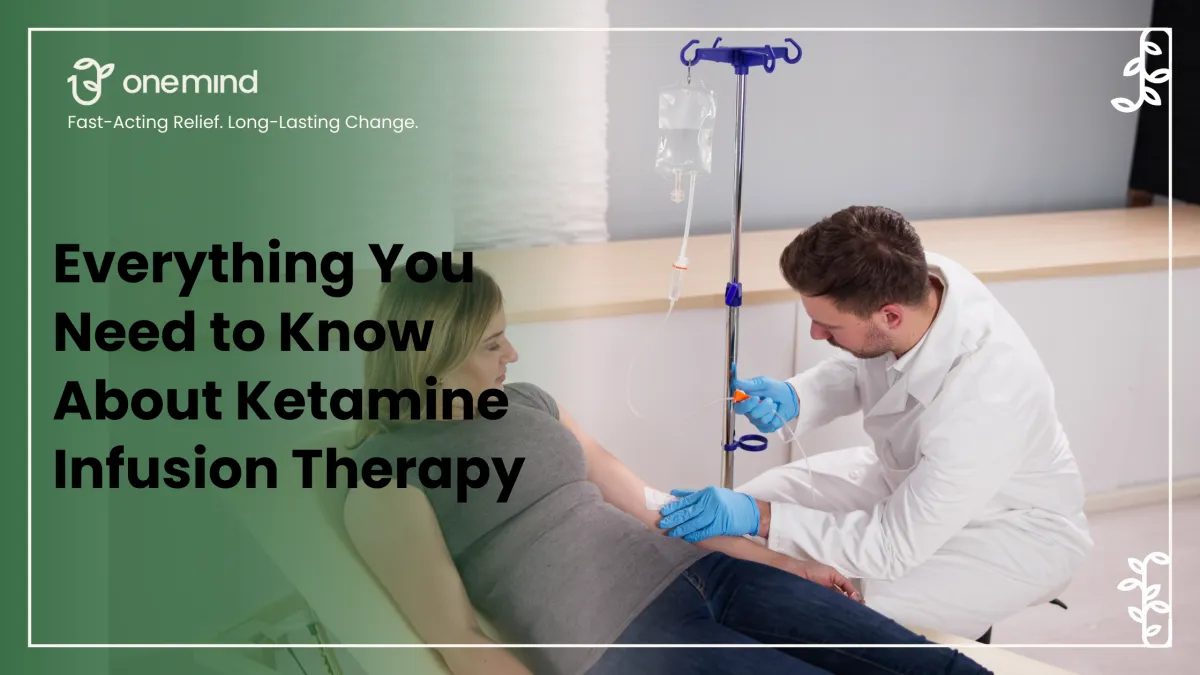Your Space
Transparent Healing.
When therapy, meds, and mindfulness aren’t enough, we help you break through—fast, safe, proven.
Blog

Everything You Need to Know About Ketamine Infusion Therapy
For a long time, we've had limited options for treating severe depression, anxiety, and chronic pain. Many people have tried various medications and therapies without finding lasting relief.
Now, a treatment called ketamine infusion therapy is offering a new ray of hope for those who have felt stuck. Let's break down what is ketamine infusion therapy, how it works, and what you can expect if you're considering this path.
What Is Ketamine Infusion Therapy?
This is a fast-acting anesthetic that was approved by the Food and Drug Administration (FDA) in the 1970s. Initially used on battlefields, it became known for reliable pain relief and sedation. Over time, researchers found that ketamine has antidepressant properties, especially in people with treatment-resistant depression.
Unlike traditional antidepressants, which may take weeks to take effect, ketamine produces results within hours. During the Vietnam War, this was commonly used in surgeries. As time passed, doctors discovered it could be used for anesthesia. Studies now support its use in treating certain psychiatric disorders and depression treatment, where other medications fail.
Infusion therapy means giving medication through a vein using an IV. This allows the infusion of ketamine to enter the bloodstream quickly. It’s highly effective and used to treat depression and chronic pain because it works faster and with more predictable results than pills. Among various delivery methods, IV ketamine stands out.
Although nasal spray forms like Spravato (esketamine) are FDA-approved for the treatment of major depressive disorder, intravenous infusion remains the most controlled and effective method. Clinics like One Mind Wellness & Ketamine prefer this route for precision.
What Is Ketamine Infusion Therapy Used For?
Mental Health Conditions
Ketamine for depression has become an important tool for patients with depression. Standard antidepressant medications usually target serotonin. In contrast, ketamine works on the NMDA receptor, offering fast relief for depressive symptoms.
For people with post-traumatic stress disorder (PTSD), ketamine therapy helps reduce flashbacks and emotional numbness. It offers hope for those who haven’t responded to other long-term treatments.
In the case of anxiety disorder, ketamine infusion may quickly stabilize mood, making it a potential alternative to SSRIs.
People with bipolar disorder may benefit from this treatment during depressive episodes. However, its use is carefully monitored to avoid triggering mania.
One major benefit is its ability to reduce suicidal ideation or mental health disorders. Some patients feel relief within hours of receiving a low dose.
Physical Health Conditions Treated
Conditions such as chronic pain, fibromyalgia, and CRPS often respond well to ketamine infusion for pain. It works by altering how the brain perceives pain, particularly by acting on glutamate pathways and affecting pain perception.
People with fibromyalgia may experience relief when treated with ketamine and lifestyle therapies. Similarly, CRPS, a condition often resistant to other treatments, can sometimes be stabilized with this.
Off-Label and Investigational Uses
Research has shown that ketamine could help with OCD, substance use disorder, and alcohol addiction. Well, it is not yet approved by the FDA for use, but clinical trial data are encouraging for using ketamine.
Who is a Candidate for Ketamine Infusion Treatment?
People diagnosed with major depressive disorder, chronic pain, or anxiety who haven’t improved with other treatments might benefit from ketamine therapy. It’s especially useful for those with treatment-resistant depression.
Not everyone is a candidate. People with a history of psychosis, hypertension, or addiction should be cautious. A full assessment by a qualified health professional is necessary.
At One Mind Wellness & Ketamine, patients go through detailed psychiatric and physical evaluations, including their full medical diagnosis, to ensure the therapy is right for them.
How Does Ketamine Infusion Therapy Work?
Ketamine has been used as a receptor antagonist that blocks the N-methyl-D-aspartate (NMDA) receptor. This helps restore healthy brain activity, which can be disrupted in treatment for depression or other psychiatric conditions.
The drug boosts glutamate, a key chemical for brain communication, promoting synaptogenesis, new brain cell connections that support mood regulation. This is the core of how ketamine treatment works.
Unlike SSRIs, which affect serotonin and take weeks to show benefits, ketamine acts within hours. This unique mechanism is why it offers hope where other antidepressants fail.
Before the Procedure
Clinicians at One Mind Wellness & Ketamine review your history of health disorders and current medications as part of a full psychological and medical intake.
Before treatment, patients must follow specific guidelines:
Food and Water Restrictions: Avoid eating 6 hours before the session.
Medication Adjustments: Some prescription drug interactions may require temporary changes.
Bring comfortable clothing and a companion to help you get home, as you might feel tired or emotional after the procedure.
During the Procedure
The treatment takes place in a relaxing room. You lie in a recliner and receive this therapy through an IV. A session lasts 40–60 minutes. You remain conscious but relaxed.
What You May Experience
Physical Sensations: You might feel floating, tingling, dizziness, or nausea.
Visual or Emotional Changes: Some people report dreamlike states or feel disconnected, known as dissociative effects of ketamine.
Vital signs are monitored throughout. A licensed, certified registered nurse anesthetist or physician is always present.
After the Procedure
You’ll rest for about an hour after the single infusion and can enjoy light snacks. Because of the sedation, don’t drive. Bring someone with you to help you home.
Common After-Effects
Emotional Reset: Many describe emotional clarity.
Physical Fatigue: Feeling tired is common.
Repeat sessions, called boosters, may be needed depending on your response and treatment goals.
Benefits of Ketamine Infusion Treatment
This therapy works fast, and people often feel better within hours or days. For people who have tried everything for deep depression or lasting pain, ketamine treatment can be a game-changer. It often works very quickly, bringing relief when other options have failed. For many, it’s a real turning point that offers a new sense of hope when they need it most.
It’s especially helpful in reducing suicidal ideation, where fast action is critical.
Increased cognition and emotional stability are also common benefits thanks to brain rewiring.
In pain cases, ketamine may reduce acute pain and improve the quality of life for those with chronic pain.
When nothing else works, this therapy for depression offers hope.
Risks and Side Effects of Ketamine
While ketamine therapy offers exciting new hope, it's also important to have a clear picture of its potential downsides. Like any powerful treatment, it isn't without risks or side effects. Understanding these ahead of time helps you and your doctor make an informed decision, ensuring the path you choose is both safe and right for you.
Common Side Effects
Dizziness
Dissociation
These usually resolve within an hour.
Psychological Reactions
Hallucinations
Anxiety or Euphoria
Rare but possible, especially at high doses of ketamine.
Rare and Long-Term Risks
Blood Pressure Spikes
Bladder Issues
More likely in non-clinical or recreational use.
FAQ
Does Insurance Cover Ketamine Infusion Therapy?
Since IV ketamine is not FDA-approved for mental health, many insurance providers do not cover it. However, some companies may be covered by insurance for pain management.
Flexible financing options exist:
FSA / HSA
CareCredit
Custom clinic payment plans
Is Ketamine Infusion Therapy Addictive?
Well, it has both risks and benefits. But in clinical settings, ketamine treatment is monitored and safe. Recreational ketamine use is risky, but that’s different from supervised therapy. Clinics have protocols to limit misuse and monitor responses.
Is Ketamine Infusion Therapy FDA Approved?
The nasal spray form (Spravato) is FDA-approved for major depressive disorder. IV use is common but remains off-label. Ongoing studies continue to explore the effectiveness of ketamine. Talk to your provider about access, efficacy, and legal use.
Conclusion
Ketamine infusion therapy offers a new path to healing for people with persistent mental and physical struggles. It works differently from traditional meds and shows promise for fast, meaningful results.
For long-term effects of ketamine, professional care really matters. Always get treatment from trained healthcare teams like those at One Mind Wellness & Ketamine. If you’re struggling with treatment-resistant depression or chronic pain, this therapy for depression may be what you’ve been looking for.
Have questions? Learn more about ketamine treatments by reaching out to One Mind Wellness & Ketamine.
COMPANY
CUSTOMER CARE
LEGAL
Copyright 2025, One Mind | All Rights Reserved.
Powered by WebPanda

